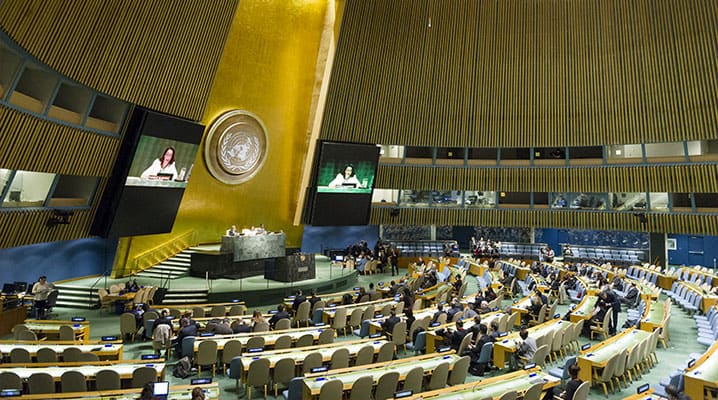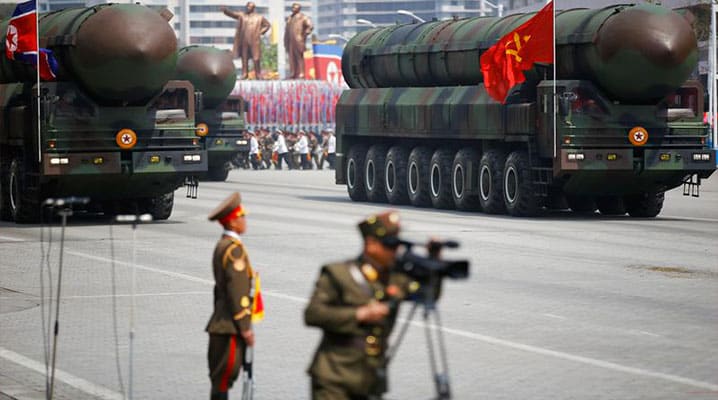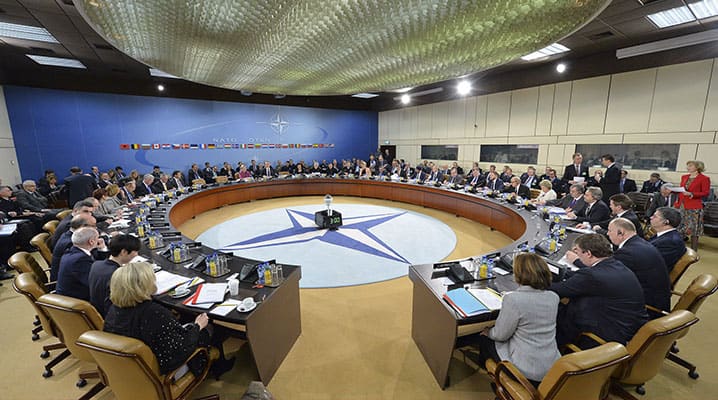Last March the United Nations commenced negotiations on a Nuclear Weapons Ban Treaty. According to its proponents, this process should result in a legally binding international agreement to prohibit nuclear weapons, ultimately leading towards their total elimination. While all Nuclear Weapon States and their allies either objected or abstained, the Resolution passed the UN General Assembly last December with a clear majority that even included a “yes” vote by North Korea. With further sessions scheduled for June and July, some believe that a Nuclear Weapons Ban Treaty could be adopted rather quickly. But the NATO Allies are justified in their scepticism towards this Treaty.
The outgoing Obama Administration had made it clear that it expected its allies to come out against the Ban exercise. This was not without irony, considering that the same Administration had started out with its own ambitious effort to abolish nuclear weapons. Yet the Obama Administration knew only too well that the Nuclear Weapons Ban had nothing to do with its own “Prague agenda”. In his major speech in the Czech capital in April 2009, President Obama had laid out a vision that centred on the gradual reduction of the salience of nuclear weapons. By contrast, a Nuclear Weapons Ban that seeks to stigmatise these weapons immediately is fundamentally incompatible with Obama’s measured approach.

The United Nations commenced negotiations on a Nuclear Weapons Ban Treaty on 27 March 2017. © United Nations
The Nuclear Ban Treaty process will not be as short-lived as the Prague agenda. It has the support of many nations, and its institutionalisation in the UN framework will prevent it from fading into obscurity, even if public interest in nuclear matters remains low. Why, then, did the United States and its NATO Allies, who have stated on numerous occasions that they seek “to create the conditions for a world without nuclear weapons” come out so strongly against an effort that – at least superficially –aspires to that very same goal? The answer to this question becomes clear once one examines the Ban idea more closely. There are several reasons why the NATO Allies are justified in their scepticism towards the Nuclear Ban Treaty exercise.
1. The disarmament challenge
The Ban’s aim is to de-legitimise nuclear weapons, but it says nothing about how to abolish them. Indeed, even some of its instigators frankly admit that they do not know where this initiative will be going. They seem content with putting pressure on the Nuclear Weapons States (and their allies) by “naming and shaming” them into a major change of their security policies. This, they hope, will set in train a virtuous disarmament dynamic that should ultimately result in total nuclear abolition. In other words, while the Ban’s immediate aim is just to challenge the nuclear status quo, its proponents assume that the other pieces of the puzzle will fall into place later.
This assumption is rather optimistic. A Chemical Weapons Convention has been in existence for two decades, yet chemical weapons are still being used, on more than one occasion and by more than one actor, most recently in Syria. The universal stigmatisation of chemical weapons notwithstanding, the chemical weapons ban continues to suffer from a host of challenges regarding verification and attribution. It has clearly not led to a global disarmament dynamic. And if some regimes ultimately chose to refrain from using chemical weapons, as did Saddam Hussein in the first Gulf War (after having employed them against Iran in the 1980-1988 Iran-Iraq War), it was not because they feared the moral outrage of the international community, but serious military reprisals. In other words, a ban does not necessarily lead to abolition, let alone a prohibition on use.

Despite the existence of a Chemical Weapons Convention for two decades, chemical weapons are still being used, most recently in Syria. Pictured a man carries the body of a dead child, after what rescue workers described as a suspected gas attack in rebel-held Idlib, Syria, 4 April 2017. © REUTERS
2. The challenge of moral suasion
Neither NATO Allies nor many other countries are likely to sign up to a Ban Treaty. Accordingly, since treaties cannot create obligations for third parties unless they expressly agree, a Ban will not be legally binding for those who do not wish to be bound by it. Ban supporters seek to get around this dilemma by arguing that social norms can be as important as legal ones: by reinforcing the stigmatisation of nuclear weapons, a Ban would help foster the emergence of a social norm against them. However, the examples they frequently cite remain unconvincing. This is particularly true for Ban Treaty advocates comparing the abolition of nuclear weapons with the abolition of slavery. While it is true that there is now a global social norm as well as legal provisions against slavery, some have estimated that today there are more slaves (almost 30 million) than at any time in human history.
And there is more. Unlike the abolition of slavery, for which the continued existence of some slaves poses essentially a moral challenge, the abolition of nuclear weapons must be truly comprehensive to be effective: one cannot tolerate even one nuclear holdout. Equally importantly, the abolition of slavery could be championed as an end in itself: if all men are created equal, slavery is unacceptable. However, nuclear weapons do have a security value: to prevent war by inducing political restraint. Their abolition is thus not an end in itself, nor is it automatically the morally superior position: if nuclear abolition would make major war and therefore mass casualties more likely, it could well be considered immoral.
3. The challenge to the Nuclear Non-Proliferation Treaty
One frequently cited rationale for the Nuclear Weapons Ban proposal is the slow progress on disarmament in the framework of the Nuclear Non-Proliferation Treaty (NPT). If the Nuclear Weapons States are unwilling to deliver on their commitment to embark on nuclear disarmament as stipulated in Article 6 of the NPT, so the argument goes, a solution has to be found outside that framework. This argument appears straightforward, yet it is highly problematic. The NPT may have its flaws, but it remains the only near-universal accepted regulatory framework for nuclear possession and non-possession. Moreover, it establishes transparency in both the civilian and military nuclear domain, and it serves as a yardstick for identifying unwelcome behaviour. By outlawing nuclear weapons instead of regulating their existence, a Nuclear Ban Treaty would pull the rug from under the NPT, and thus from the delicate balance of obligations of Nuclear and Non-Nuclear Weapon States it represents. The NPT framework would continue to exist, but it would be deprived of the flexibility that has been essential for its inclusiveness.
The Ban is therefore much more than a shortcut to get around the slow progress on Article 6: it is a barely hidden assault on the entire fabric of the NPT. Behind closed doors, some supporters of a Ban actually admit that the effect on the NPT could well be detrimental, yet since they have lost patience with the NPT they feel that radical steps are justified. It is therefore hardly surprising that even countries such as Germany, which is usually not known to take hard-line positions on nuclear arms control matters, strongly objected to the Ban effort, arguing that it undermines the NPT without offering anything better to replace it with.
4. The challenge to Western defence policies
The Nuclear Ban Treaty is meant to be universal, but in practice, it will only affect Western democracies. Assuming that a “managed democracy” (V. Putin) like Russia, a tightly controlled China or a totalitarian North Korea will feel compelled to act upon such a Ban appears far-fetched. The de-legitimisation of nuclear weapons can only work in places with a vibrant civil society; the mere hope that the groundswell of global public opinion could also lead to changes in closed societies is a convenient myth.

Recent tests have increased international concerns about North Korea’s capability. Pictured intercontinental ballistic missiles are driven past the stand with North Korean leader Kim Jong Un during a military parade marking the 105th birth anniversary of country's founding father Kim Il Sung, in Pyongyang, 15 April 2017. © REUTERS
The political asymmetries between the Western and non-Western states will almost guarantee an asymmetrical outcome: Western nuclear deterrence policies will be de-legitimised; the nuclear policies of non-Western countries will remain unhampered. Hence, arguments that, over time, even the latter group of countries could not resist the normative power of a Ban appear doubtful: as the rather muted public reaction against the use of chemical weapons by both the Assad regime and the “Islamic State” demonstrates, ban movements are primarily about finding fault with Western policies, and show little curiosity regarding others. The pressure they exert on non-Western states will remain minimal.
Advocates of a Nuclear Weapons Ban vehemently deny the charge that they neglect real-life security concerns for the sake of moral grandstanding. They argue that since nuclear abolition will be a long-term process, there is ample time to discuss and eventually iron-out remaining security issues. That this argument is a mere smokescreen becomes clear when the discussion centres on extended nuclear deterrence (the ability of US military forces, particularly nuclear forces, to deter attack on US allies and thereby reassure them): many Ban advocates want it to end right now. Extended deterrence and NATO’s nuclear sharing arrangements are short-term targets. Indeed, for many Nuclear Weapons Ban advocates, ending extended deterrence and nuclear sharing seem far more urgent than, for example, removing North Korea’s growing nuclear arsenal. Once again, the professed universalism is but a thinly veiled assault on Western policies. This is all the more problematic as the most worrisome nuclear arsenals today are those of some smaller countries rather than those of the major powers or their alliances.
Putting the cart before the horse
Supporters of a Nuclear Weapons Ban often argue that the disarmament process that will eventually follow the de-legitimization of nuclear weapons will be gradual and take account of all nations’ security concerns. However, the way in which they frame their case clearly shows that their true aim lies elsewhere: to put pressure predominantly on Western countries. The critique of Western deterrence arrangements, combined with the striking silence on developments elsewhere, reveal the same underlying dynamics that characterised – and ultimately undermined – previous nuclear disarmament movements

NATO Allies have stated on numerous occasions that they seek “to create the conditions for a world without nuclear weapons”. By taking into account the broader strategic context and putting policy before weaponry, this remains the more plausible approach.
They all failed because they put the cart before the horse: Instead of focusing on the security dilemmas and underlying political conflicts that lead to nuclear possession and the adoption of nuclear deterrence strategies, they focused on abolishing the nuclear weapons themselves. However, hopes that by changing military postures one could induce positive political change were never realised: the end of the Cold War, for example, did not come about by fewer weapons, but by more democracy. Once political antagonisms receded, disarmament set in – not the other way around. Hence, NATO’s formula to create the conditions for a nuclear-free world remains the more plausible approach. By taking into account the broader strategic context, it puts policy before weaponry. It thus avoids the negative militarism inherent in nuclear abolition schemes.
